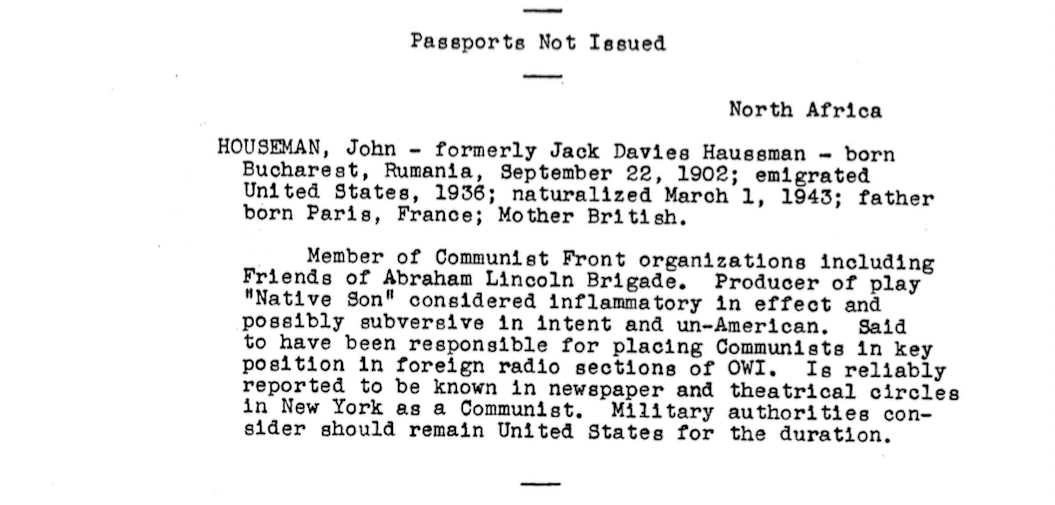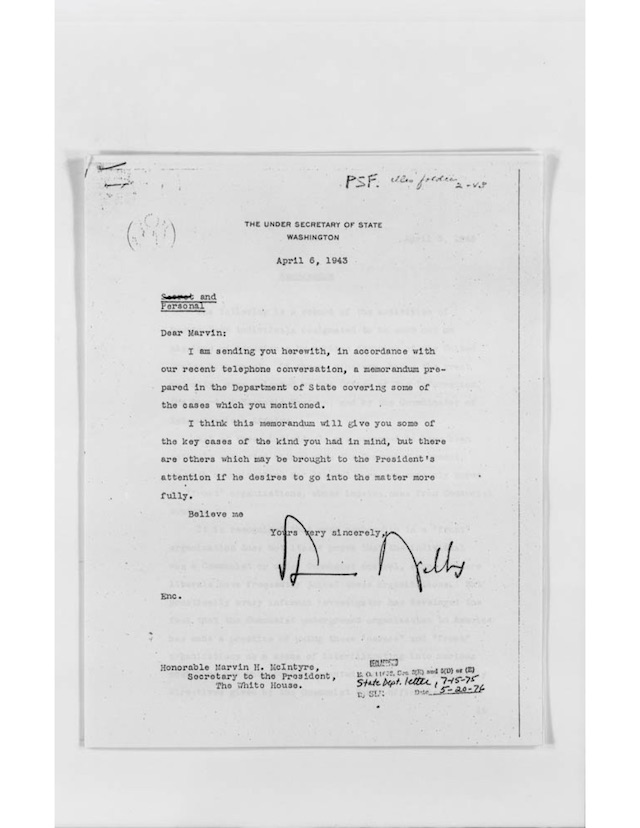The problem the Roosevelt administration had with John Houseman, the first Voice of America Director (VOA) in the Office of War Information (OWI), was not his immigration status or citizenship. He was initially hired by the same administration, although U.S. citizenship should have been the minimal requirement for his position. The real concern, as it developed later, appeared to have been his links with the Communist Party, the hiring of communists, and the Moscow-line content of VOA broadcasts. His immediate boss, Joseph Barnes, who was a U.S.-born citizen, was fired for the same reasons Houseman was forced to resign quietly from his government position.
The type of citizenship or national origin did not seem to matter much in Houseman’s case, but it may have increased suspicions against him, as it did against other recent immigrants from Europe. In his case, the authorities would have fewer reasons to be suspicious. Although he was born in Romania, his mother was British and his father was French. He grew up and was educated in England, spoke perfect English, was fully integrated into American life, had powerful friends in Hollywood and New York, and did not fit the profile of a typical enemy spy. The official focus was on his contacts with the Communist Party and accusations that he was hiring communists. Whether his previous immigration status played any role in the investigation into his past cannot be determined from the available documents. It may have had a minor impact.
Houseman looked down on most foreign-born broadcasters, especially those who did not share his own leftist and pro-Soviet political views. He referred to them as “hyphenated Americans.” According to Houseman, “certain governments in exile and organized groups of hyphenated Americans used the Communist innuendo as their principal weapon in their repeated attempts to influence our foreign propaganda.”
The State Department informed the White House that Houseman was among several senior OWI employees, both U.S.-born and naturalized citizens, whose applications for official U.S. passports were denied. Under Secretary of State Welles wrote that other such cases may be brought to the President’s attention if he desires to go into the matter more fully. There was no known follow-up from the White House in Houseman’s case.
It is not clear from the memorandum whether the State Department and the Army Intelligence would have also objected to Houseman traveling abroad as a private citizen during the war. They most likely would have, since at that time, even being suspected of membership or having links to a subversive organization without any definite proof or due process was seen as sufficient grounds for denying U.S. citizens the right to travel abroad.
Addendum to April 5-6, 1943 memoranda from Undersecretary of State Sumner Welles to Honorable Marvin H. McIntyre, Secretary to the President, The White House.

Addendum to April 5-6, 1943 memoranda from Undersecretary of State Sumner Welles to Honorable Marvin H. McIntyre, Secretary to the President, The White House. Passports Not Issued –North Africa – HOUSEMAN, John – formerly Jack Davies Haussman, the first Director of the Voice of America (VOA) in the Office of War Information (OWI).
Passports Not Issued
North Africa
HOUSEMAN, John – formerly Jack Davies Haussman – born Bucharest, Rumania, September 22, 1902; emigrated United States, 1936; naturalized March 1, 1943; father born Paris, France; Mother British.
Member of Communist Front organizations including Friends of Abraham Lincoln Brigade. Producer of play “Native Son” considered inflammatory in effect and possibly subversive in intent and un-American. Said to have been responsible for placing Communists in key position in foreign radio sections of OWI. Is reliably reported to be known in newspaper and theatrical circles in New York as a Communist. Military authorities consider should remain United States for the duration.
2
Houseman may not have been a registered Communist Party member, but there is evidence that both before and during his employment as VOA director he enthusiastically supported Soviet policies, sometimes against American interests, although he probably did not think he was in any way disloyal or wrong in his official actions. General Dwight Eisenhower believed that communist-influenced and pro-Soviet Voice of America broadcasts put the lives of American soldiers under his command in North Africa and Italy at risk. Even John Houseman noted in his memoir Eisenhower’s bitter criticism of VOA as reported in a 1943 front-page article in the Chicago Tribune. Houseman described the Chicago newspaper as “anti-Administration,” but he also noted that the “liberal New York Post, also reported that VOA “propagandists were giving him as much of a headache as the Germans.”
3
It is known that General Dwight Eisenhower, Commander of North African Expeditionary Force, has appealed to the War Department for protection against the American propaganda being distributed by Sherwood’s O.W.I. on the ground that it is doing more harm to the expeditionary force than to enemy morale.
John Houseman appeared to have been a true believer in some of the lofty ideas of communism, as well as Stalin’s good intentions. And he was by far not alone in that belief among Left-wing West European and American intellectuals and artists of that period who were faced with the growth of fascism in Europe and persistent racism and discrimination in the United States. Houseman’s OWI patron, Joseph Barnes, was listed in the addendum to the same State Department memo as having received a U.S. passport to accompany Republican politician Wendell Willkie on his trip abroad as Roosevelt’s informal envoy to show bipartisan American support for the war. The memo only raised questions about Barnes’ naive pro-Soviet views and following “the Party line.” Barnes’ position within the organization was above Houseman’s. Houseman dedicated the first edition of his memoirs to Barnes.
It was true, as the State Department memo warned, that Houseman had been “responsible for placing Communists in key positions in foreign radio sections of OWI.” His pick as Voice of America chief news writer and editor was Howard Fast, a best-selling American writer and future Communist Party USA activist and journalist who in 1953 received the Stalin International Peace Prize. Howard Fast and others like him were Houseman’s ideological and intellectual companions. It turned out that in some cases, their loyalties were not with the United States but with the Kremlin and the communist movement. After the war’s end, not many but several of these VOA broadcasters went back to their native countries to work for the Soviet-imposed regimes and engaged in anti-American propaganda. Several of them had worked during the war on the Voice of America Polish desk.
READ MORE:
First VOA Director was a pro-Soviet Communist sympathizer, State Dept. warned FDR White House
Notes:
- John Houseman, Front and Center, 1st Touchstone ed, A Touchstone Book (New York: Simon and Schuster, 1980), p. 69. ↩
- President (1933-1945 : Roosevelt). 1933-1945, State – Welles, Sumner, 1943-1944, Series: Departmental Correspondence, 1933 – 1945, 1933. National Archives Identifier: 16619284 ↩
- Houseman, Front and Center. p. 83. ↩





Add Comment